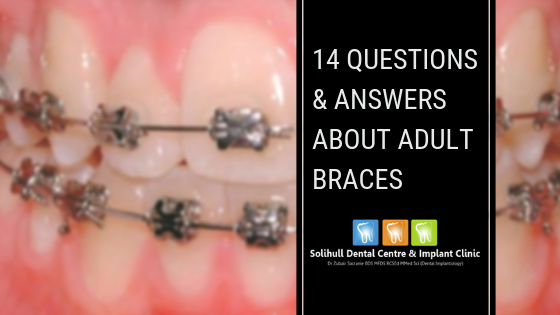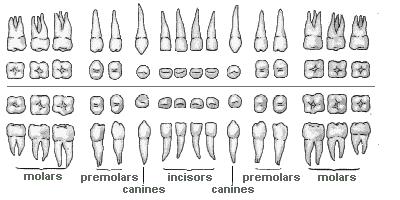 With so many people now considering wearing braces way beyond their childhood and teenage years we thought it would be appropriate to answer as many questions as we can about braces for adults, including fixed braces & invisible braces.
With so many people now considering wearing braces way beyond their childhood and teenage years we thought it would be appropriate to answer as many questions as we can about braces for adults, including fixed braces & invisible braces.
1. Is it necessary to remove teeth before having braces?
It may sometimes be necessary to remove teeth. It depends on your clinical situation. Very often teeth become crooked because they are overcrowded and they’re physically isn’t enough room for all of the teeth to be straight. Removing teeth allows the remaining teeth to be straightened in the most efficient manner. You would generally only need to have teeth removed if your teeth are crowded, if you want orthodontics because your teeth are spaced then tooth removal would not normally be necessary.
2. What is the age limit for wearing braces?
There isn’t an age limit for braces to move teeth. The only real criteria is that you are dentally fit and healthy which does become more problematic as you age.
3. Is it bad for your gums to start wearing braces in my 20s?
Being 20 is still very young and it would be absolutely fine to wear braces. So long as the braces are designed well they should not be bad for your gums. You will also need to make sure that you are cleaning your teeth adequately everyday, this is far more likely to be bad for your gums than braces themselves. A dental hygienist can help with this.
4. What is it like to wear braces as an adult?
It depends on what type of braces you have. Lingual braces (braces that fit on the inside of your teeth) can be a little uncomfortable to begin with but are virtually invisible. Braces on the front of your teeth, often known as train tracks make not look quite as good however, with modern techniques such as ceramic braces with white wires they can be virtually imperceptible.
5. How long should you wear braces?
Some treatments can be undertaken in around 12 weeks, other treatments can take up to 2 years. Shorter treatments usually only involve the top front teeth, front teeth have smaller and less complex roots than back teeth and are therefore quicker and easier to move. If your orthodontic brace is to move back teeth then treatment times can be significantly longer.

Image source: thesebonesofmine.wordpress.com/category/teeth/
6. Is it embarrassing to wear braces to college?
There are a couple of ways to deal with embarrassment from wearing braces at College or University. One way is to opt for more invisible braces such as lingual, Invisalign or ceramic braces. These are very discreet systems.
Another way to deal with embarrassment is to make a statement with your braces. You could opt to have various coloured bands on your metal brace, these can be chosen to match your favourite sports team or colours and can make a real fashion statement.
The key is to let your dentist or orthodontist know about your concerns and you can then decide together the best way to overcome them.
7. What are some tips for surviving adult braces?
Our tips for surviving adult braces are:
- Accept that there will be some mild discomfort for a couple of days each time the braces are adjusted, typically every 4-6 weeks.
- Clean your braces fastidiously after every meal.
- Invest in interdental brushes so that you can clean between the brackets adequately.
- Be prepared for a lull in your motivation towards the end of treatment. Many patients find the final couple of months difficult as they have had the bulk of change they require and now just want to get the braces off. Being prepared to this can help you deal with how you feel towards the end of treatment.
- Book a celebration meal for when you’re braces come off with all of the favourite foods you haven’t been able to eat during treatment.
- Talk to your orthodontist or dentist throughout treatment. If you’re having problems then let them know as they are almost always ways to help.
8. What are the disadvantages of wearing braces?
Some disadvantages of wearing braces can be:
- Mild discomfort each time they are adjusted.
- The length of treatment. Sometimes this can be up to 2 years.
- For braces which are fitted on the front surface of your teeth they can sometimes irritate your cheeks and cause ulcers.
- The braces cost and sometimes put people off although there are almost always payment options available.
9. Orthodontics: Do braces really work?
Yes. The science of orthodontics is now clearly understood. Simply putting pressure on the tooth in a particular direction will move it. The proof of this is that sometimes we need to use orthodontics to correct accidental childhood movement of the bone. If a child sucks their thumb very hard at a young age they can move the bone in the roof of their mouth. Because the bone is moved it also moves the teeth leaving them with buck teeth.
Orthodontics use utilises this very same principle but in a controlled manner to move the teeth into a position we want.
10. How do people feel about adult braces?
The results speak for themselves. Patients are invariably delighted with the result of adult braces and feel younger, fresher, brighter and more confident.


11. How effective is orthodontics in grown ups?
In days gone by orthodontics was only offered to children and teenagers. Adults are usually considered not tolerant of the classic NHS braces which were metal and obtrusive. Advances in modern techniques to provide more aesthetic braces (Although not an nhs treatment) has meant that adults have opted to have orthodontics also. Orthodontic results are extremely good in adults.
Any orthodontics will also require you to wear a retainer, this can sometimes be a removable device so adults need to remember that this will need to be worn, usually at night, after treatment.
12. What age is too old to start using braces (for teeth)?
So long as your oral health is in good condition then no age is too old to start using orthodontic braces.
13. What are the pros and cons of dental braces?
On the positive side:
Dental braces maintain your natural tooth structure meaning your teeth stay as healthy as possible, just in a new position. Dental braces are therefore one of the most holistic and health-conscious ways to straighten crooked teeth.
On the negative side:
Dental braces often take at least three months to work, sometimes up to 2 years. So if you’re looking for a quick result then you may like to look at other cosmetic dentistry alternatives such as veneers or bonding.
14. What are the various types of braces?
Dental braces typically come in 3 varieties:
- Rapid.
- Imperceptible.
- Complex.
Rapid systems include things like Invisalign Lite or the Inman aligner. These typically move front teeth only (their roots are shorter and so can be moved quicker) to more cosmetically acceptable positions. Often this is only rotating or tipping teeth rather than removing them bodily.
Imperceptible systems include Invisalign, lingual and ceramic braces. Some of these more imperceptible systems utilise clear aligners, some of them at the orthodontic braces on the tongue side of your teeth whilst others use ceramic/clear braces with white wires on the front of your teeth to be completely tooth coloured.
Complex systems include ceramic/clear braces and conventional metal train track braces. These can be used to move teeth bodily, including the more difficult to move back teeth.
These three alternatives are not mutually exclusive, for example ceramic braces (complex) are also virtually invisible. Some of the systems are also removable (Inman aligner, Invisalign) whilst others are fixed (metal train track braces or clear/ceramic braces)
Summary
There are so many questions about orthodontics that you may like to ask, our Solihull Dental Practice is happy to take questions and queries from you on social media stream, we also recommend that you speak to your own dentist about your concerns and questions.
All problems exist in the absence of good communication… So let’s talk.
Zubair Sacranie
Latest posts by Zubair Sacranie (see all)
- What To Do When Half Your Tooth Breaks Off? - 31st March, 2025
- Dental Implants in Solihull: Your Complete Guide - 28th January, 2025
- When Do Baby Teeth Fall Out and Adult Teeth Come In? - 1st December, 2024


